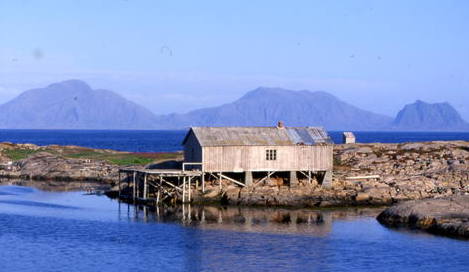The Vega archipelago, just south of the Arctic Circle, with its ancient eider duck farms and fishing villages, is at risk of sinking beneath the sea, according to the study, which appraises the potential loss of world heritage sites worldwide over the next 2,000 years.
"When thinking about climate change, people usually think about ecological and economical consequences," Ben Marzeion, study author and climate scientist at the University of Innsbruck, told The Local. "We wanted to add another dimension: what might the cultural impacts be? Culture is hard to quantify, but for the Unesco list there is general agreement that these sites are significant and worthy of special consideration and protection,"
Marzeion found that 40 Unesco worldwide sites would be affected by rising oceans over the next 2,000 years if global warning continued at the same rate, and that a "not improbable" three-degree rise in temperature over the same period would affect 136 Unesco sites worldwide.
The Vega Archipelago (English), a group of 6,500 small islands in Nordland county was made a world heritage site in 2004 in recognition of the unique way of life that has been practised there since the stone age.
"The Vega archipelago reflects the way generations of fishermen and farmers have, over the past 1500 years, maintained a sustainable living in an inhospitable seascape near the Arctic Circle, based on the now unique practice of eider down harvesting," Unesco writes. "it also celebrates the contribution made by women to the eider down process."
Norway's relatively steep and mountainous coastline makes it one of the countries whose heritage is least likely to be affected: Sweden stands to lose the ancient Hanseatic town of Visby and the port of Karlskrona; Denmark will see the loss of Kronborg Castle, and Roskilde Cathedral;while Germany stands to lose the historic city centres of Hanseatic trading hubs in Lübeck, Bremen, Straslund and Wismar.
In his report, Marzeion noted that other Norwegian sites, most notably Bergen's historic Bryggen district, could also be under threat.
"These unquantified uncertainties tend for our estimate to be rather an underestimation of the impacts of SLR [sea level rise] than an overestimation. An example for this is the
Bryggen site in Bergen, Norway, where dense buildings and surrounding steep terrain lead to an overestimation of the elevation, even though it experiences episodic flooding already under current conditions," Marzeion wrote.
He concludes his study with a warning for action against global warming.
"Future generations will face either loss of these sites, or considerable efforts to protect them," he warned.


 Please whitelist us to continue reading.
Please whitelist us to continue reading.
Member comments